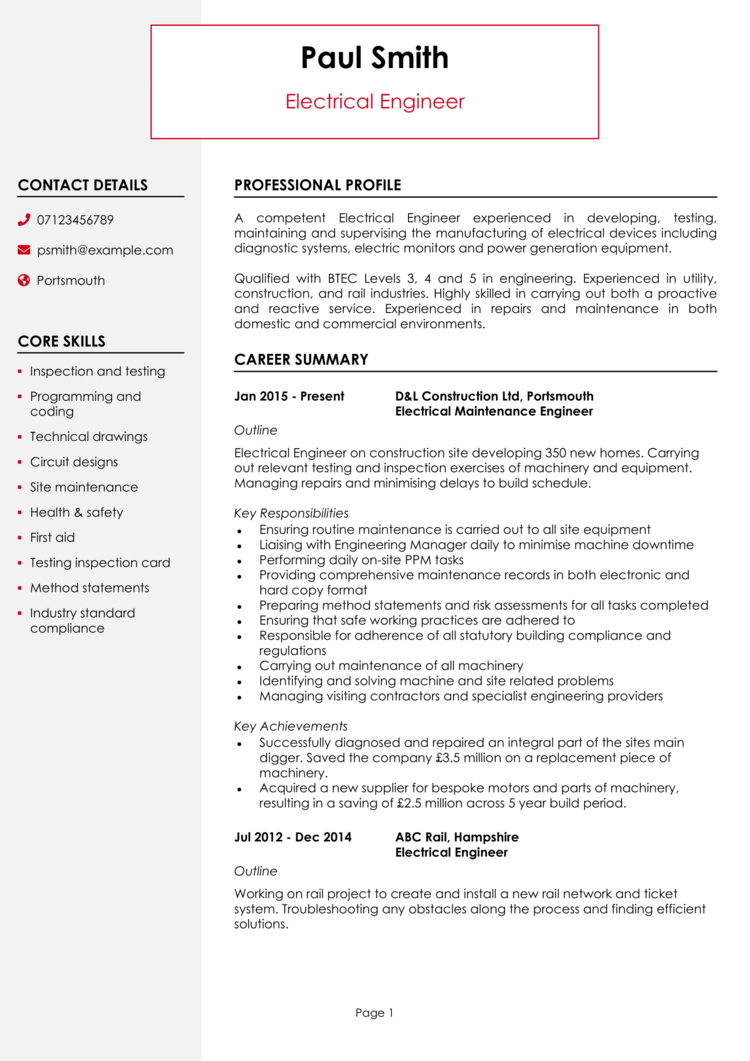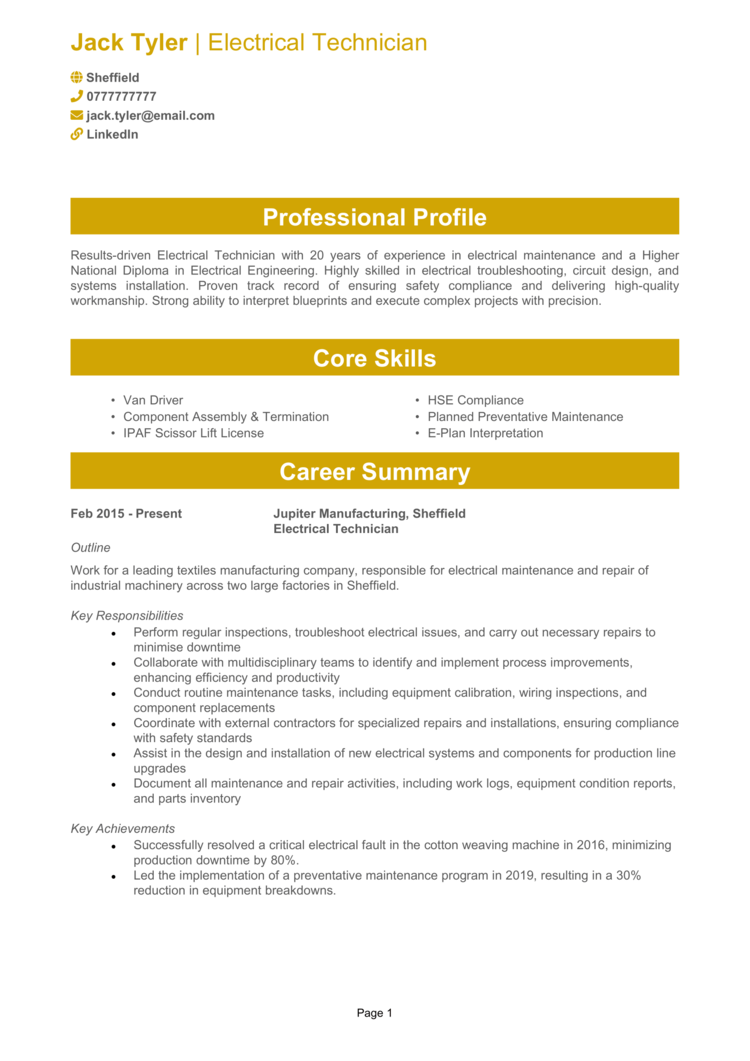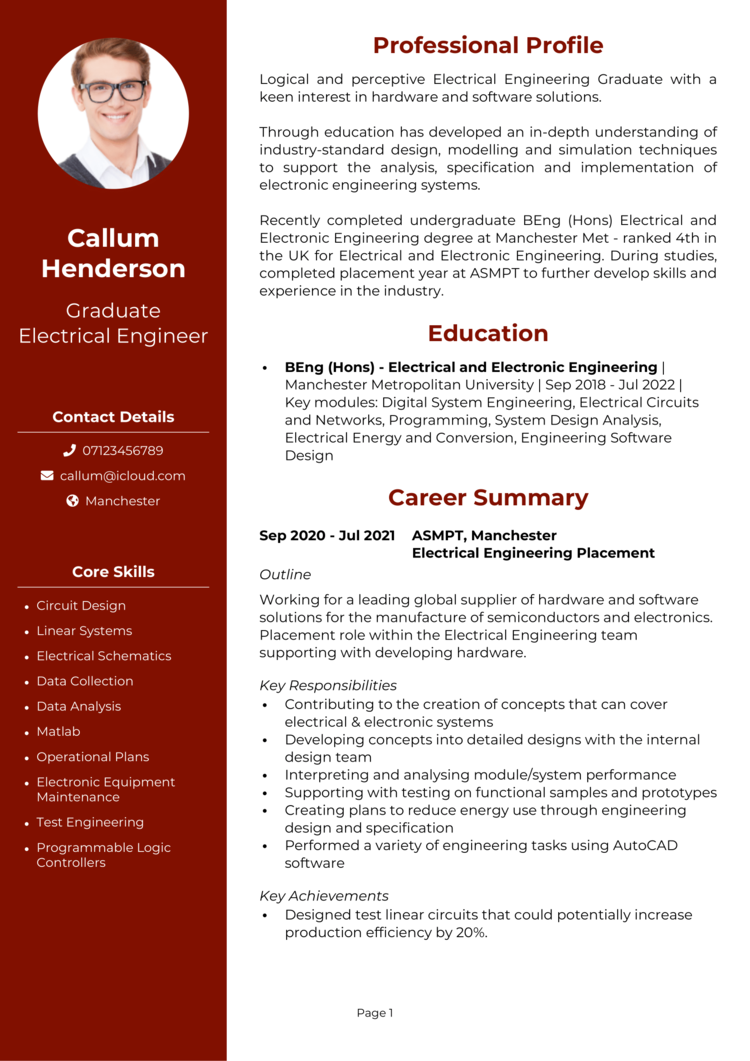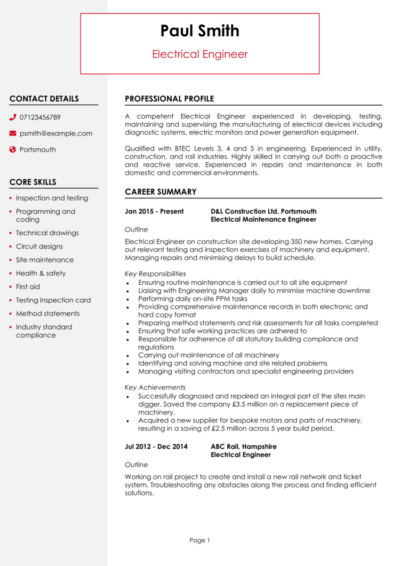From designing circuits to troubleshooting power failures, electrical engineers like you keep the world running.
But before you can wire up your next big opportunity, you need to ensure your CV is properly connected. This guide and its Electrical Engineer CV examples will help you construct an application that highlights your engineering expertise and technical skills – so you can spark interest with recruiters and land the job.
Electrical Engineer CV

Maintenance Engineer CV

Electrical Technician CV

Graduate Electrical Engineer CV

How to write your Electrical Engineer CV
Learn how to create your own interview-winning Electrical Engineer CV with this simple step-by-step guide.
A great electrical system is well-planned, efficient, and free of unnecessary components – your CV should be the same. If recruiters have to search too hard for your qualifications and experience, they might just pull the plug on your application.
This guide will take you step by step through how to structure your CV, highlight your key electrical engineering skills, and present your experience in a way that keeps your application fully charged and ready for the next stage.
How to create a good structure for your Electrical Engineer CV


Writing a CV should ensure recruiters can quickly assess your qualifications and technical expertise without getting lost in a tangle of details. If they have to dig through your CV structure like an electrician tracing a hidden fault, they might just pull the plug on your application
Here’s the CV layout you should follow:
- Name and contact details – Ensure your name and personal details are easily visible at the top. A photo is optional and depends on the role.
- Profile – Craft a short introduction that showcases your professional background and key accomplishments.
- Core skills – List your key abilities in this section, focusing on those that will be most relevant to the job, such as circuit design, power distribution, and fault diagnosis.
- Work experience – Provide a detailed breakdown of your work history, starting with the most recent job first.
- Education – List your qualifications, including degrees and relevant certifications, in reverse chronological order.
- Additional info – Use this optional space for relevant hobbies, professional memberships, awards, or personal pursuits that enhance your application.
Electrical Engineer CV format


A messy circuit leads to system failures, and a messy CV can short-circuit your chances of landing an interview. Keep your application well-structured, professional, and easy to read. Even the most well-qualified engineers will miss out if formatting mistakes overshadow their expertise.
Here are some tips to keep your format the best it can be:
- Bullet points – Use short, sharp bullet points to present your responsibilities and achievements clearly.
- Divide sections – Make use of distinct headings and logical spacing to guide recruiters through your CV.
- Use a clear and readable font – A simple, professional font ensures readability while keeping the layout polished and tidy..
- No more than 2 pages – This length gives you space to detail your experience while keeping it concise enough to respect the recruiter’s time.
What is an Electrical Engineer CV profile?


Your CV profile is your chance to showcase why you’re the perfect candidate. Think of it as the schematic that maps out your expertise, industry knowledge, and problem-solving approach: your ultimate goal here is to convey the benefits of hiring you over someone else.
Electrical Engineer CV profile examples
Profile 1
Detail-oriented Electrical Engineer with four years of experience in designing, testing, and maintaining electrical systems for commercial and industrial applications. Skilled in circuit design, power distribution, and PLC programming. Proficient in AutoCAD, MATLAB, and ETAP for electrical analysis and system optimisation. Committed to ensuring safe, efficient, and cost-effective electrical solutions.
Profile 2
Results-driven Electrical Engineer with three years of experience in renewable energy systems and power grid infrastructure. Adept at conducting load flow analysis, troubleshooting electrical faults, and implementing energy-efficient solutions. Skilled in SCADA systems, power electronics, and regulatory compliance. Passionate about developing sustainable energy solutions to improve electrical efficiency.
Profile 3
Experienced Electrical Engineer with over six years of expertise in automation, control systems, and embedded electronics. Skilled in designing and implementing electrical control panels, integrating IoT-based monitoring systems, and ensuring compliance with safety standards. Proficient in Python, C++, and hardware simulation tools such as LTspice and Simulink. Dedicated to delivering high-performance electrical solutions.
What to include in your Electrical Engineer CV profile
Your profile should include the following:
- Industry experience – Whether it’s energy, automation, telecommunications, or manufacturing, highlight your sector experience.
- Technical expertise – Specialised skills in power systems, control systems, or PCB design should be mentioned.
- Project achievements – If you’ve optimised efficiency, reduced downtime, or improved electrical systems, showcase the impact.
- Problem-solving abilities – Highlight your experience diagnosing faults, enhancing systems, or ensuring compliance with safety regulations.
- Software and tools – Mention any experience with CAD software, MATLAB, or electrical simulation tools.
Core skills section


Your core skills section should give hiring managers a quick glance at your technical expertise with a simple column of bullet points. Since electrical engineering covers a wide range of specialisms, tailor this section to match the job description.
For example, if the role is focused on power systems, highlight skills like grid analysis and electrical safety. If it’s electronics-based, emphasise circuit design, PCB development, and microcontrollers.
Top skills for your Electrical Engineer CV
- Circuit Design and Analysis – Designing, testing, and troubleshooting electrical circuits for various applications.
- Power Systems Engineering – Developing and maintaining electrical power distribution systems for residential, commercial, and industrial use.
- PLC Programming and Automation – Working with programmable logic controllers (PLCs) to automate electrical systems and industrial processes.
- Electrical Safety and Compliance – Ensuring designs and installations adhere to regulations such as IEEE, NEC, or IEC standards.
- Electronics Troubleshooting – Diagnosing and repairing electrical faults in systems, machinery, and consumer electronics.
- Microcontroller and Embedded Systems – Programming and integrating microcontrollers for smart devices and automation projects.
- Renewable Energy Systems – Designing and optimising solar, wind, and other sustainable energy solutions.
- Power Electronics – Working with converters, inverters, and motor control systems for efficient energy transmission.
- Testing and Measurement – Using tools like oscilloscopes, multimeters, and spectrum analysers to test electrical components and circuits.
- Project Management and Documentation – Planning projects, managing budgets, and maintaining detailed technical reports for stakeholders.
Work experience


Your work experience section should show that you’re not just plugging things in – you’re solving real problems. Recruiters want to see how you’ve applied your expertise to solve problems, enhance systems, and drive improvements.
List your roles in reverse chronological order, keeping each entry structured with bullet points. If you’re a graduate or have limited industry experience, highlight projects, internships, or research work related to electrical engineering.
How to structure jobs

- Outline – Introduce the company, your role, and the type of electrical work you handled.
- Responsibilities – List key tasks, such as designing systems, troubleshooting faults, and ensuring regulatory compliance. Use action words like “designed”, “implemented”, and “analysed”.
- Achievements – Highlight measurable results, such as improved system efficiency, reduced energy costs, or enhanced safety measures.
Sample work experience for an Electrical Engineer
Electrical Engineer | PowerTech Solutions
Outline
Designed and maintained electrical power systems for commercial buildings within an engineering consultancy firm, ensuring compliance with industry regulations, safety standards, and optimal energy efficiency.
Responsibilities
- Developed electrical layouts and schematics using AutoCAD and ETAP.
- Performed load calculations and selected appropriate electrical components for system efficiency.
- Supervised installation and commissioning of electrical systems, ensuring project deadlines were met.
- Conducted fault analysis and implemented corrective measures to minimise downtime.
- Collaborated with project managers and contractors to ensure seamless integration of electrical designs.
Achievements
- Optimised power distribution systems, reducing energy consumption by 15 percent.
- Successfully led an electrical upgrade project, improving system reliability and reducing failures.
- Recognised for maintaining high safety standards, achieving zero workplace incidents.
Electrical Engineer | GreenVolt
Outline
Developed and maintained renewable energy systems at a renewable energy company, focusing on solar and wind power integration for residential and commercial applications to enhance sustainability and efficiency.
Responsibilities
- Designed and installed solar PV systems, conducting site assessments for optimal performance.
- Performed load flow analysis and grid integration studies for renewable energy sources.
- Developed energy-efficient solutions to reduce operational costs for clients.
- Ensured compliance with local and international electrical safety standards.
- Provided technical support and troubleshooting for renewable energy installations.
Achievements
- Increased solar panel efficiency by 12 percent through improved system design.
- Reduced energy costs for clients by 20 percent through optimised power management solutions.
- Received industry recognition for innovation in renewable energy system design.
Electrical Engineer | AutomateTech Systems
Outline
Designed and implemented automation and control systems for an industrial automation company, ensuring efficiency, safety compliance, and seamless integration of electrical systems in manufacturing processes.
Responsibilities
- Developed PLC-based control systems for automated production lines.
- Programmed and integrated SCADA systems for real-time monitoring and control.
- Designed electrical control panels and ensured compliance with IEC standards.
- Conducted system testing and troubleshooting to enhance operational reliability.
- Collaborated with mechanical and software engineers to develop integrated automation solutions.
Achievements
- Reduced system downtime by 30 percent through proactive maintenance and upgrades.
- Optimised manufacturing processes, increasing productivity by 25 percent.
- Recognised for delivering cost-effective and scalable automation solutions.
What’s the best way to write an education section?


Electrical engineering is a field where qualifications matter, so make sure your education section is clear and well-structured. Past experience is still key, however, so this part should still be brief.
List degrees in Electrical Engineering, Electronics, or related fields prominently. If you’ve completed specialist training in automation, control systems, or renewable energy, highlight those qualifications to strengthen your application.
Top qualifications to showcase on an Electrical Engineer CV
- Bachelor’s or Master’s Degree in Electrical Engineering – The foundation for a professional engineering career.
- Institution of Engineering and Technology (IET) Membership – Recognised in the UK and valuable for professional networking.
- Chartered Engineer (CEng) or Incorporated Engineer (IEng) Status – A mark of professional competence and expertise.
- AutoCAD Electrical Certification – Essential for engineers working in design and drafting.
- 18th Edition Wiring Regulations (BS 7671) – A must-have qualification for engineers working with electrical installations.





